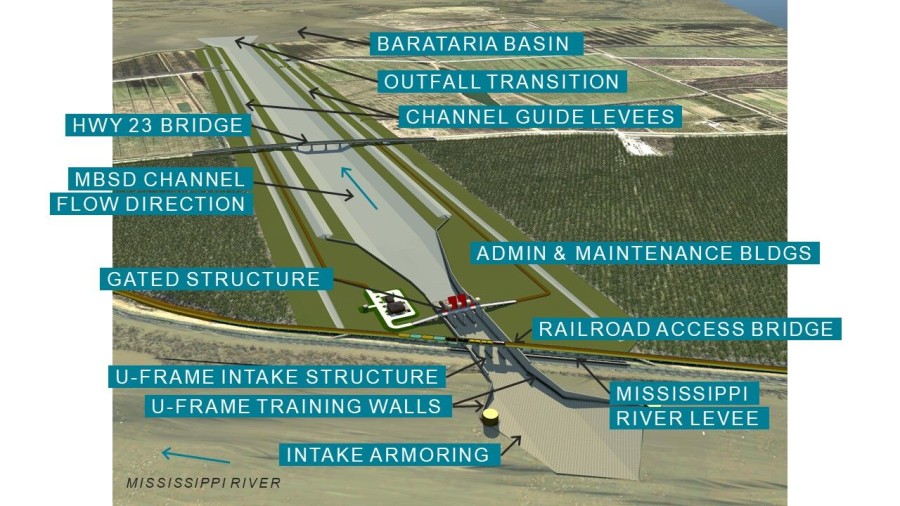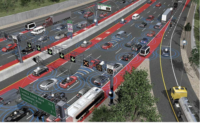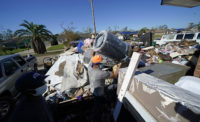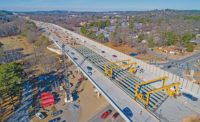Industry leaders and lawmakers in Louisiana are eyeing infrastructure projects as the remedy for its coronavirus-plagued economy. In addition to seeking ways to fast-track existing projects, they’re pinning their hopes on an unprecedented infusion of federal cash to tackle the state’s backlog of infrastructure work.
Just a few days after signing the unprecedented $2 trillion federal stimulus plan on March 27, President Donald Trump called for another $2 trillion relief package, this time to fund infrastructure such as roads and bridges. The prospect of dedicating such a massive amount of money solely to infrastructure has sparked conversations among industry leaders eager for the state to address its unmet infrastructure needs, which long predate the COVID-19 pandemic.
“When this thing finally breaks, what better way is there to get the economy back on its feet than to spend money on public works projects and infrastructure,” says Ken Naquin, CEO the Louisiana Associated General Contractors.
One strategy Louisiana lawmakers are trying is to speed up already funded infrastructure projects. There’s been a push at the state level for Louisiana to move forward with its plan for spending $1.2 billion in federal grant money the state received in 2018 for flood mitigation. In February, the U.S. Dept. of Housing and Urban Development approved Louisiana’s plans for the grant money. The state had been expecting the funding to become available this spring.
And earlier this week, state Sen. Cameron Henry, R-Metairie, urged Louisiana’s congressional delegation to push for an emergency exclusion from permitting requirements from the U.S. Army Corps of Engineers to fast-track coastal restoration projects, including the $800 million Mid-Breton Sediment Diversion project in Plaquemines Parish. The project was paid for by settlement money from the 2010 BP Deepwater Horizon explosion and oil spill.
“The funding is already there. It’s the federal government holding up those projects,” Naquin says. “So we need a jump start to get these projects started.”
What Naquin says the state’s infrastructure needs more than anything is federal money to fund highway, airport, port and other transportation projects. “It would take another stimulus bill, which is what they’re talking about in Congress,” he says.
Robert S. Boh, president and CEO of Boh Bros. Construction in New Orleans, believes federal infrastructure funding would not only help revive the state economy after the coronavirus outbreak, but it could also be the answer to the the state’s longstanding infrastructure needs. Louisiana has a $14 billion backlog of road and bridge projects.
“The funding of capital improvements has always been pushed to the back burner in many cases in favor of more pressing annual operating needs,” he says.
Boh cites legislative efforts that have failed in recent years to raise the state’s gas tax, which has not seen an increase since 1989.
“That’s the backdrop in this segment of construction,” Boh says. “So were there a federal bill to provide funding for projects that could bridge the gap between what we failed to do last year and what we hope to do in 2021, that would be tremendous.”
One of the challenges the state faces is its lack of “shovel-ready” projects, meaning projects that are far enough along in the planning and permitting process that they could get started as soon as funding becomes available. “If there are projects that only need money, then absolutely that could put the industry to work to pick up the slack for private-sector opportunities that may take awhile to come back,” Boh says.
Although much of Louisiana’s work force is under state orders to stay home to slow the spread of COVID-19, contractors are considered “essential” employees, and many of them are still on the job throughout the state. But industry members are reporting slowdowns because of private-sector interruptions, lags from material suppliers, and workers who don’t feel safe showing up to jobsites. “Luckily, our contractors are still working. They just need more work,” Naquin says.
Boh says his company has had the opportunity to continue all of its jobs, both public and private, including the $100 million first phase of the $450 million renovation of the Mercedes-Benz Superdome. Boh Bros is also completing a $60 million shoulder addition for the Lake Pontchartrain Causeway Bridge, which is receiving $100 million in safety improvements.
“We’re eagerly looking for the contents of whatever the next federal legislation might be, and how that might provide money to infrastructure work we have here in Louisiana,” Boh says. “Hopefully, that might come through in a way that our agencies can put that money to work and bid jobs they might not have been able to until now.”





Post a comment to this article
Report Abusive Comment